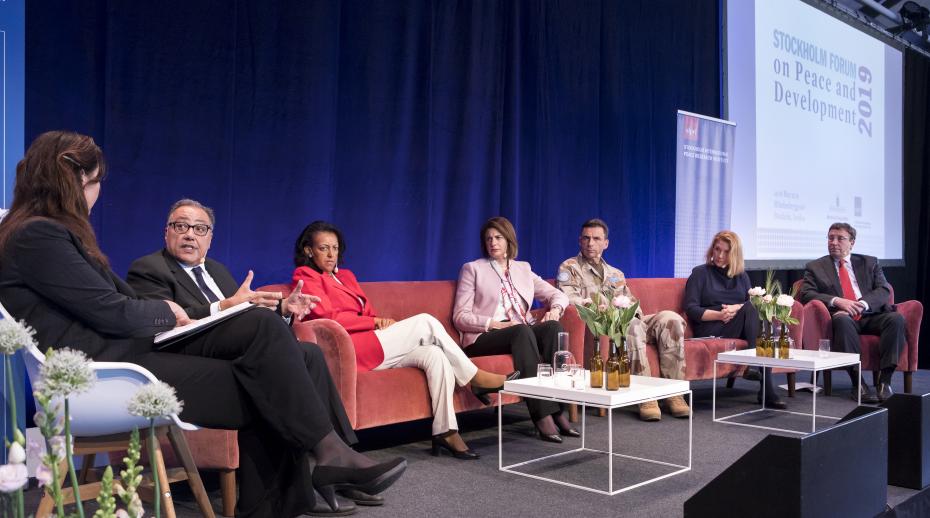
(Stockholm 14 May 2019) Over the next three days, over 400 high-level policymakers, researchers and practitioners gather in Stockholm for the sixth annual Stockholm Forum on Peace and Development. Watch the livestream of the opening session here. The afternoon panel, ‘Inclusive peace: Beyond stabilization and towards sustainable development’ will also be live-streamed. Photos of the opening session are available here.
This year’s forum centres on the topic ‘From crisis response to peacebuilding: Achieving synergies’ and was opened by Ambassador Jan Eliasson, former United Nations Deputy Secretary-General and Chair of the SIPRI Governing Board. Ambassador Eliasson’s address touched on the broad range of actors and peacebuilders and emphasized the risks of actors working in silos.
HE Peter Eriksson, Minister for International Development Cooperation, Sweden, provided introductory remarks and pointed out that the various efforts among the development community ‘do not always add up.’
Guest speaker for the opening session was Dr Sima Samar, Chair, Afghanistan Independent Human Rights Council and member of the UN Secretary-General High-Level Panel on Mediation. Dr Samar shared her knowledge of Afghanistan—a country that has endured over 40 years of conflict. From her experiences, ‘when people’s human rights are violated; when their freedom is restricted; when there is discrimination against people; where there is no equality; and there is no access to justice for people—then conflict starts.’ She underlined the need for the meaningful inclusion of women and minorities at all stages of the peace process and during post-conflict reconstruction.
The keynote address was given by Peter Maurer, President, International Committee of the Red Cross. On the need for the stronger connections between humanitarian aid; development cooperation; and peacebuilding, Maurer stressed that ‘humanitarian actors are not peacebuilders. Neutral, impartial and independent humanitarian action is distinct from political agendas and it must remain so. Yet, I would argue that while others make peace, humanitarian action helps make peace possible.’
The theme for the opening panel was ‘Crisis response and peacebuilding: How to create synergies’ and was moderated by Annika Ben David, Ministry for Foreign Affairs, Sweden.
Achim Steiner, Administrator of the United Nations Development Programme, highlighted the World Bank’s ‘Pathways to Peace’ report and how the United Nation’s Sustainable Development Goals (SDGs) have laid out a vital roadmap for the future, but also for managing the risks of today.
HE Raya Haffar El Hassan, Minister of Interior and Municipalities, Lebanon, remarked on the differing agendas between donors and how better synthesis between donors could lead to a more sustainable peace.
Hafez Ghanem, Vice President for Africa, World Bank outlined the new role of the World Bank in investing in peace. Pointing to a number of key initiatives and ways of analyzing the Sahel; the Lake Chad Basin; and the Horn of Africa regions, he stated the need to focus on the drivers of fragility such as climate change and exclusion.
HE Hirut Zemene, State Minister for Foreign Affairs, Ethiopia, emphasized the role of youth development—a theme echoed by other panellists—and stressed the demographic challenge in Ethiopia and elsewhere.
General Dennis Gyllensporre, Force Commander of the United Nations Multidimensional Integrated Stabilization Mission in Mali (MINUSMA), called for better conflict analysis in the early stages of crises and the need to share in a combined body of knowledge. General Gyllenspore stated ‘we all have different blind spots depending on what lens we use.’ Sharing knowledge, he said, ‘will give us a sense of a common understanding of the conflict dynamics.’
Karin Wallensteen, State Secretary for International Affairs, Prime Minister’s Office, Sweden, spoke on collective outcomes. ‘I believe that if we have this nexus of humanitarian efforts; development efforts; and peace efforts we can give the relief and at the same time keep our focus on the SDGs.’
About SIPRI and the Stockholm Forum
The 2019 Stockholm Forum on Peace and Development enables interdisciplinary exchange among global thought leaders with the aim of influencing key policy and research agendas. It is co-hosted by SIPRI and the Swedish Ministry for Foreign Affairs.
SIPRI is an independent international institute dedicated to research into conflict, armaments, arms control and disarmament. Established in 1966, SIPRI provides data, analysis and recommendations, based on open sources.
The Ministry for Foreign Affairs is responsible for developing and implementing Sweden’s foreign policy. In addition to overseeing the operations of the country’s embassies and consulates, the Ministry for Foreign Affairs is responsible for Sweden’s development cooperation, trade and investment.
For editors
For media or photo requests, please contact SIPRI’s Communications Officer Alexandra Manolache alexandra.manolache@sipri.org, +46 76 628 61 33.
Photos and videos from the event are available on the SIPRI website. Follow on Twitter with #SthlmForum. Livestreams of panel discussions are available on SIPRI’s Facebook page and YouTube channel.